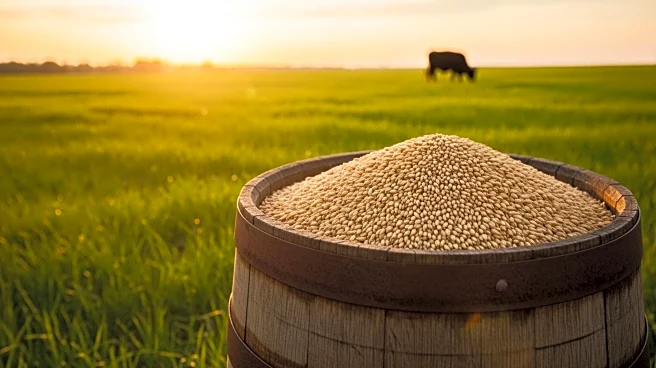What's Happening?
Jack Daniel's distillery in Lynchburg, Tennessee, is ending its Cow Feeder Program, which has provided free or low-cost distillers' grain to local farmers for 45 years. This nutrient-rich mash, a byproduct of whiskey production, has been crucial for farmers like Terry Holt, who rely on it to keep feed costs low and cattle healthy. Starting next spring, the distillery will redirect this waste to Three Rivers Energy, a renewable energy firm that will convert it into biogas and fertilizer. This decision aligns with Jack Daniel's sustainability goals to reduce emissions and landfill use. However, local farmers, who haul away approximately 300,000 gallons of this mash daily, face increased costs and tighter margins, exacerbated by existing challenges such as drought and inflation.
Why It's Important?
The termination of the Cow Feeder Program is significant for Moore County, where nearly 90% of farms are livestock operations. The free supply of distillers' grain has been a backbone for small farms, allowing them to avoid high commercial feed prices. With feed costs already elevated nationwide, the loss of this resource could lead to financial strain for local farmers, potentially forcing them to sell off herds or land. This move highlights the tension between corporate sustainability goals and local economic survival, as companies prioritize environmental targets over longstanding community relationships.
What's Next?
Jack Daniel's has been notifying farmers about the change since 2022, emphasizing the necessity of the shift to meet global environmental standards. The new anaerobic digester facility by Three Rivers Energy will help the distillery generate renewable energy from waste. While the company remains committed to its neighbors, the decision raises questions about the future of small towns reliant on big brands. Farmers like Terry Holt hope their concerns will resonate with decision-makers, as the community faces the challenge of adapting to this new era.
Beyond the Headlines
This development underscores a broader trend in rural America, where corporate sustainability initiatives often clash with local economic needs. As companies seek to monetize waste and reduce emissions, communities that have historically supported these businesses may find themselves marginalized. The situation in Moore County serves as a reminder of the complex dynamics between corporate growth and local traditions, prompting discussions on the balance between environmental responsibility and community loyalty.









